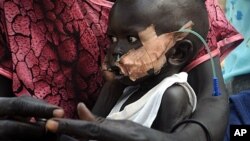Next to the storehouse in Yida's village square, refugees line up for food rations meant to last their families the rest of the week. Each person receives three kilograms of sorghum. It’s not much, but it is all that can be spared.
Food has been sparse since the South Sudan camp was bombed in early November, and international organizations, including the World Food Program, have pulled out, ending regular shipments.
The majority of the food now comes from Canadian missionary organization Samaritan’s Purse. The group, which pulled only its international staff, still ships in some food by plane, but it's not enough to feed the entire camp.
The situation has only been exacerbated by recent fighting near the border, where Sudanese Army forces and the army of South Sudan battle each other in Jau, a town some 30 kilometers away.
The United Nations is hoping to move the camp's inhabitants to a safer area, but the refugees don't want to go, saying they would rather stay in Yida, where they hope to build their lives.
Children in need
In the Samaritan’s Purse nutrition center, Ramadan Abbas, an infant, sits with his older sister Estedad after receiving emergency feeding. Ramadan’s feeding tube has been inserted through his nose and taped to his face. His hands have also been taped to prevent him from removing it.
Estedad says Ramadan, who had not been eating and started to become sick, recently started having diarrhea and vomiting. One of more than 500 children in Yida who have become malnourished since the regular food shipments stopped last month, he has improved over the past two days.
The camp’s health coordinator, James Konda, also a refugee, says the food shipments are not only too little, but lack nutritional variety.
"It is the first time that I saw today they distributed [cooking] oil - it has never been distributed here," says Konda. "What I saw is only sorghum and sometimes beans. So the provision of proteins, even second-class proteins, is not provided adequately for the people."
With as many as 24,000 refugees living in Yida, and some 300 arriving each day, the nearby fighting only hampers United Nations efforts to provide, let alone expand, relief. U.N. Refugee Agency, UNHCR, desperately wants to relocate Yida’s population to Nyeel, 73 kilometers south, where it can allow them to provide greater assistance in a safer environment.
Resolved to stay in place
But refugees say the proposed site in Nyeel is a swamp and they don’t want to go.
"Our people are mountainous people," says Hussein Al Gumbullah, chairman of the Yida camp. "It is a danger for them to stay in jungles or swamp areas."
The refugees in Yida are mainly farmers from the Nuba mountains, and they argue that they will not be able to provide for themselves if moved to Nyeel.
And for many, dangers at Yida don't compare to the daily bombings they survived in Sudan’s South Kordofan state.
Even Estedad, with her younger brother in the nutrition center, says she prefers to stay in Yida, explaining that she feels safe here. While she sometimes worries that the Antonov planes of the Sudanese air force may return, she doesn’t want to move to Nyeel.
While getting food into camps remains a problem, things are improving in Yida - refugees have established schools for the children, and relations with the local community are good.
But UNHCR is still trying to convince the refugees to move to Nyeel. Discussions between refugee leaders and UNHCR officials appear deadlocked, but, in the meantime, the refugees in Yida are determined to carry on with their lives.
Refugees in South Sudan Determined to Stay




